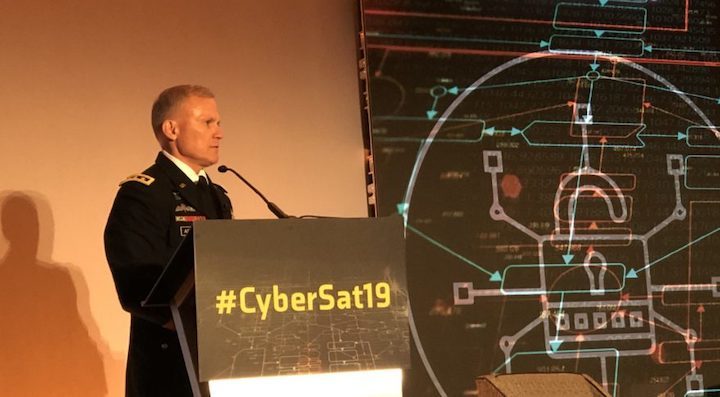9.11.2019

RESTON, Va. — The director of the Defense Intelligence Agency said it’s not a matter of if, but when anti-satellite weapons developed by China and Russia take aim at U.S. spacecraft.
“These capabilities exist now,” Army Lt. Gen. Robert Ashley, director of the Defense Intelligence Agency, said Nov. 7 at the CyberSat 2019 conference.
In a keynote speech to a large crowd of space industry executives, Ashley ran through a list of capabilities — including surface-to-air missiles, lasers, electronic jammers, co-orbital maneuvering satellites and malware — that Russia and China have developed and continue to advance in order to target U.S. satellites and ground control systems in a future conflict.
China and Russia are also working on more complex “counter-space” capabilities designed to deny the U.S. military access to its satellites, said Ashley.
“I painted a rather negative picture,” he said, but insisted this is an issue that the space industry and the public at large cannot ignore.
Ashley noted that the Defense Department had been reluctant to discuss this issue publicly until former secretary Jim Mattis pushed for a more open conversation on the challenges the U.S. is likely to encounter in space. The DIA was directed to write an unclassified report on foreign counter-space threats that the agency released in February.
“It’s amazing how much information we got into 30 pages,” said Ashley. “Part of the reason we wanted to put that out at the unclassified level is so we can start the dialogue,” he said. If DoD is going to ask Congress to approve larger budgets for space programs, Ashley added, lawmakers need to be able to communicate to the public why the nation is making these investments.
Air Force calls for more open dialogue
Despite efforts to bring more information into the public domain, more declassification of space topics is needed, argues the chief of staff of the Air Force Gen. David Goldfein.
As the service responsible for most of the military’s space programs, the Air Force has difficulties explaining to lawmakers and congressional committee staffs why more investments are needed because that requires going into classified areas, Goldfein said Nov. 6 at an Air Force Association event on Capitol Hill.
Goldfein said the Air Force plans to request a $9 billion funding increase for “defensive and offensive space capabilities” over the next five years. “One of our challenges is how to explain this to the media, the Hill, to staffers,” said Goldfein. “So much of what we’re doing in space is classified,” he added. “We tend to over-classify things we’re doing in space.”
He said the Air Force has made “game changing” investments across its space programs to reduce the risk that U.S. satellites face but those efforts also are classified. Telling members of Congress and staffs “just trust me, we’re doing good stuff” doesn’t sell, said Goldfein. “We need to make sure they understand.”
Quelle: SN
